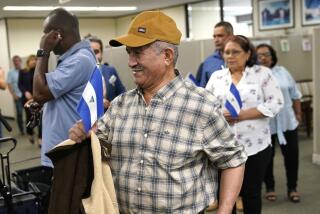Truce With Nicaragua Indian Rebels Reported
- Share via
MANAGUA, Nicaragua — The Sandinista government has signed a cease-fire agreement with two Miskito Indian leaders that is expected to lead to the return of hundreds of displaced Indians to their homes in northeastern Nicaragua, Miskito spokesmen and sources close to the negotiations said Friday.
The accord is a step toward resolving a nagging political and military problem for the government with Nicaragua’s Indian tribes. It also reflects disarray among Indian leaders who have been allied with U.S.-backed, right-wing rebels fighting the Sandinista government.
The two Miskito leaders, Orlando McClean and Roberto Pantin, are said to represent about 500 guerrilla fighters. Their supporters are gathered in villages near Puerto Cabezas on Nicaragua’s Caribbean coast.
One Indian spokesman said, “They had no food or medicine. They had to talk.”
Riverside Town
Anthropologist Roxanne Dunbar, a U.S. citizen, said followers of the two Miskito leaders may return to their homes on the banks of the Coco River as early as today. They originally lived in and around the riverside town of Waspan, Dunbar said. The guerrillas are not being disarmed, she added.
Members of Indian groups number about 100,000 inside Nicaragua.
Three years ago, the government evacuated tribes from their homelands in an attempt to quell a rebellion among the Miskito, Suma and Rama Indians who live in the eastern section of the country.
Traditionally, the Indians mistrusted governments dominated by Spanish-speakers from the Pacific coast. Many resisted Sandinista education and economic schemes as well as relocation and fled the country to join anti-government rebels known as contras.
Some aligned themselves in Honduras with the Nicaraguan Democratic Force, among whose leaders are officers who served in the National Guard of deposed Nicaraguan dictator Anastasio Somoza. Others went to Costa Rica to join the Revolutionary Democratic Alliance, originally headed by dissident Sandinista commander Eden Pastora.
Adverse Publicity
The ruling Sandinistas have long sought a negotiated peace with the Indians. Adverse publicity from the forced evacuation of the Indians has long plagued the regime. Dozens of Indian prisoners are reported to have disappeared while in Sandinista custody and have not been accounted for.
Recently, the government has published articles in official journals laying out autonomy schemes for the Indian areas in the eastern region.
The Indian rebels themselves have been plagued by infighting, and Misura, their organization, has been virtually leaderless since the expulsion from Honduras earlier this year of its military leader, Steadman Fagoth. Fagoth embarrassed the Honduran government by holding press conferences in that country, which maintains an official fiction that Nicaraguan rebels do not operate there.
Brooklyn Rivera, a Misura leader once allied with Pastora, broke away to enter peace talks with the Sandinistas. As a result, other leaders of the group moved to expel him.
Later, Rivera pulled out of the peace talks, charging the Sandinistas with “intransigence.” Indian leaders are meeting in Miami this week to attempt to patch up their differences.
More to Read
Sign up for Essential California
The most important California stories and recommendations in your inbox every morning.
You may occasionally receive promotional content from the Los Angeles Times.













